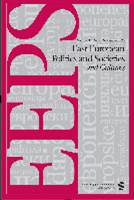Between Ideological Loyalty and Political Adaptation: The “Agrarian Question” in the Development of Bulgarian Social Democracy, 1891–1912
Between Ideological Loyalty and Political Adaptation: The “Agrarian Question” in the Development of Bulgarian Social Democracy, 1891–1912
Author(s): Kristian StefanovSubject(s): Political history, Social history, Social Theory, 19th Century, Pre-WW I & WW I (1900 -1919), Sociology of Politics
Published by: SAGE Publications Ltd
Keywords: social democracy; political adaptation; “agrarian question”; democratic politics; political modernization; populism;
Summary/Abstract: At the end of the nineteenth century, European social democracy found acceptance among some circles of the Bulgarian intelligentsia. However, the social base of this new ideology, including industrialization and urbanization, was almost missing. This contradiction confronted the young party with the challenge of adapting to local social reality, not only leading it to a chain of internal ideological dilemmas questioning its social democratic identity, but also stimulating various political interactions with the public environment, culminating in a change of national politics. The present article lays out the problem of social democracy’s political adaptation by focusing first on the “Agrarian Question” debates among the party elite through investigation of the public discussions in the congresses, newspapers, and letters, and second, on political practice in the field of electoral politics through analyses of electoral statistics and mobilization discourses. The article’s main conclusions are that (1) dialectics between the intensive transfer of modern ideas and the complex process of their adaptation to national conditions is one of the “moving contradictions” of Bulgarian social democracy’s development in the Balkan peripheral context, (2) the Bulgarian Workers’ Social Democratic Party’s (BWSDP) experience confirms the more general tendency in Second International social democracy of a strong interdependence between electoral politics and ideological debates, and (3) the efforts for political mobilization of the petty peasants and artisans through Marxist language led to its evolution into a socialist-populist discourse that stimulated massification of political participation and encouraged but also opposed the early Agrarian movement.
Journal: East European Politics and Societies
- Issue Year: 37/2023
- Issue No: 04
- Page Range: 1472-1494
- Page Count: 23
- Language: English
- Content File-PDF

